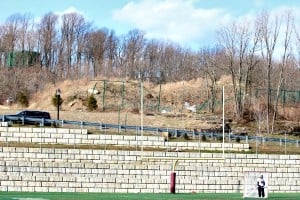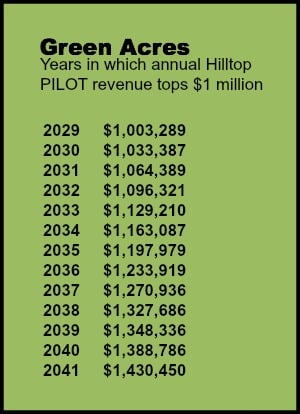
Thanks to what’s known as a payment-in-lieu of taxes or PILOT agreement, Verona will indeed get a large sum of money from the Highlands at Hilltop every year. But it’s not $1 million now and it might not be more than $1 million annually before your hair turns gray. It might not be more than $1 million before the 20-year bonds on the Hilltop Phase II sports complex, which were approved Monday night, are retired. Here’s what you need to know about Verona’s PILOT windfall.
Ordinarily, property tax revenue is split: 55% goes to the Verona Board of Education, 25% goes to town government and 20% to Essex County. In a PILOT, 95% goes to the town, 5% to the county and nothing to the BOE.
In the case of the Hilltop, the PILOT payments are based on the adjusted gross rents of the luxury complex. They rise with occupancy and rent increases, and they will go on for 30 years. But until last week, nobody on the Town Council knew exactly how much Verona would make in each of those 30 years. After repeated requests, Town Manager Joe Martin finally gave Council members two spreadsheets showing the estimated payments for Cenrose Phase I and Phase II.
 Last year was the first year of PILOT revenues from the first Highlands building, which opened in March 2010. Verona got $326,443 from the Phase I development last year. Cenrose, the developer of Highlands, broke ground on a second building in October 2011. It won’t start paying us anything on that until next year, when Verona’s projected revenue is $21,292.
Last year was the first year of PILOT revenues from the first Highlands building, which opened in March 2010. Verona got $326,443 from the Phase I development last year. Cenrose, the developer of Highlands, broke ground on a second building in October 2011. It won’t start paying us anything on that until next year, when Verona’s projected revenue is $21,292.
Taken together, the two buildings take us closer to $1 million in annual revenues, but it takes a while: 2029 to be exact. In that year, Verona will receive $1,003,289 in PILOT money. We will have 13 years of $1 million-plus revenue and the highest year for the two buildings will be 2041, when we will earn $1.43 million in one year. (By comparison, the Pilgrim Shopping Plaza paid $577,529 in property taxes last year, revenue that was then split with the BOE and County. The many condo apartments in the Claridge complex are all taxed individually.)
On Monday night, Martin told the Council that Verona will need $375,000 a year to pay the interest and principal on the bond to be issued for the new fields. At a previous meeting, he had put the yearly cost at $250,000. In addition to the higher cost, the Council must reckon with the fact that we haven’t been stockpiling the money that we’ve earned from the PILOT so far: The $326,443 earned in 2012 was used to support last year’s town budget. The $328,756 we stand to make this year has been similarly applied to the general budget.
The gradual build-up of PILOT revenue from the Hilltop could mean that the tension between town and public school budgets isn’t going to be solved soon. Even before holes opened on the upper field at Verona High School, rendering it unplayable, the Board of Education has been hoping that PILOT money could help ease its budget constraints. At a BOE meeting last October, a clearly exasperated Joseph Bellino, who serves on the BOE’s Finance committee, said “I don’t want to be antagonistic, but push has come to shove now. If they [the Town Council] are going to be generous and give us some, what can we count on?” (Martin was contacted three times for this story but has not been able to respond.)
Over the full life of the Hilltop PILOT, Verona will earn $29.4 million from the two buildings. If all goes according to plan, we should have plenty of money to pay the field debt and fund other needs. But not a million dollars a year for some time.


Virginia, Thank you for a very comprehensive explanation of a plan that has never been properly explained, in layman’s terms, to most Verona residents. I think many people thought we would be able to lean on this “Revenue” much sooner..
Great article. Joe Martin needs to go. He is never been straight with this town. Time for a change. New people, new ideas, and new buisness. Please take time to vote for town council May 14th.
Re-elect Kevin Ryan and Vote for Al DeOld!
Virginia, thank you for publishing this rundown on the PILOT money.
If I read this correctly, the anticipated PILOT revenue in 2014 would be roughly the same as the interest on the bonds for the new fields in that year. Do you know if Joe Martin’s interest calculation is for the $5 million in bonds, or just the first chunk of the borrowings?
Also, won’t regular tax revenue have to make up the roughly $330,000 of the PILOT funds that are being used now to support the general budget in 2013-14? Hard for me to see how a council member could say authoritatively that no taxpayer dollars are going to pay for the new fields.
Thanks again for reporting on this issue.
In 2014, Verona is expected to net $359,911.08 from the PILOT on the two Hilltop apartment buildings. Joe Martin has said that Verona would use short-term notes during the construction phase of the project and convert to long-term debt once work is complete in two to three years. If that occurs in 2015, we will have $663,292.31 from the PILOT; if it is 2016, we will have $683,181.08.
Martin told the Council on April 15 that we will need $375,000 annually to service the long-term debt. We used all $326,443 of the PILOT money earned in 2012 to square the town budget. The $328,756 we will get this year will also plug the general budget. If you assume that we continue to need that much to support the general budget, then we would need $703,756 in PILOT money to cover that and the debt service. We won’t be getting that much in revenue until 2017.